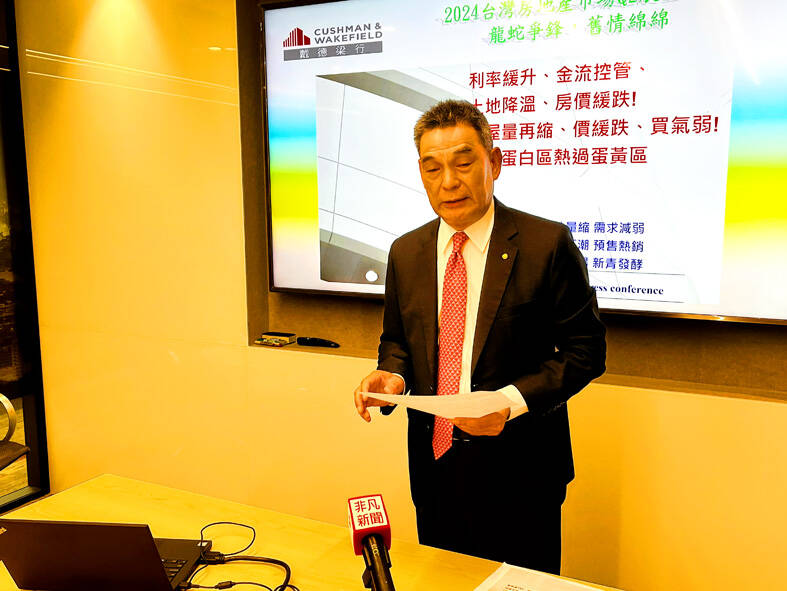Commercial property transactions last quarter spiked 51.5 percent year-on-year to NT$21.2 billion (US$662.94 million), driven by strong demand for office buildings from different sectors, property broker Cushman & Wakefield Taiwan said yesterday.
Power supply and electronic components maker Delta Electronics Co (台達電) bought two office buildings in Taipei’s Neihu District (內湖) from Nan Shan Life Insurance Co (南山人壽) for NT$4.79 billion to meet self-occupancy needs, making it the largest deal in the quarter, the broker said.
Goldsun Building Materials Co (國產建材) sold a commercial complex in Tainan for NT$1.64 billion, the second-largest transaction, followed by the acquisition by Taishin Life Insurance Co (台新人壽) of an office building in Tainan for NT$1.45 billion, it said.

Photo: Hsu Yi-ping, Taipei Times
Strong office demand and ample liquidity accounted for the impressive showing in the commercial property market, Cushman & Wakefield Taiwan said, adding that self-occupancy demand would continue to drive the market this quarter and beyond.
Land deals totaled NT$63.7 billion during the first quarter, above NT$60 billion for the first time since 2022, suggesting the market is emerging from selective credit controls and other unfavorable policy measures, the broker said.
It was a stark contrast to the average of NT$30 billion a quarter last year, it said.
As for residential property, Cushman & Wakefield Taiwan managing director Billy Yen (顏炳立) said the government’s interest subsidy for first-home purchases and Taiwan Semiconductor Manufacturing Co’s (TSMC, 台積電) capacity expansion have lent support to the segment.
Presale projects have proved popular in locations near TSMC’s new plants nationwide, as the plants create well-paid jobs for people with real housing demand, Yen said.
Separately, property transactions in the nation's six special municipalities climbed to 23,409 units last month, rising by 12.2 percent from a year earlier, as the government's interest subsidy spurred sentiment among first-home buyers and people’s attitude toward real-estate market turned more positive, data compiled by local land administration agencies showed yesterday.
Among the six special municipalities, transactions in Taipei jumped the most by 34.9 percent to 3,042 units and Tainan surged 32.7 percent to 2,894 units, while Taoyuan rose 16.9 percent to 3,970 units and Kaohsiung increased 11.5 percent to 3,839 units. New Taipei City saw transaction grow 2.4 percent to 5,671 units but Taichung witinessed a decline of 1.3 percent to 3,993 units, data showed.
Overall, total transactions in the six cities during the first quarter increased 28.3 percent from a year earlier to 63,226 units, data showed.

NEW IDENTITY: Known for its software, India has expanded into hardware, with its semiconductor industry growing from US$38bn in 2023 to US$45bn to US$50bn India on Saturday inaugurated its first semiconductor assembly and test facility, a milestone in the government’s push to reduce dependence on foreign chipmakers and stake a claim in a sector dominated by China. Indian Prime Minister Narendra Modi opened US firm Micron Technology Inc’s semiconductor assembly, test and packaging unit in his home state of Gujarat, hailing the “dawn of a new era” for India’s technology ambitions. “When young Indians look back in the future, they will see this decade as the turning point in our tech future,” Modi told the event, which was broadcast on his YouTube channel. The plant would convert

‘SEISMIC SHIFT’: The researcher forecast there would be about 1.1 billion mobile shipments this year, down from 1.26 billion the prior year and erasing years of gains The global smartphone market is expected to contract 12.9 percent this year due to the unprecedented memorychip shortage, marking “a crisis like no other,” researcher International Data Corp (IDC) said. The new forecast, a dramatic revision down from earlier estimates, gives the latest accounting of the ongoing memory crunch that is affecting every corner of the electronics industry. The demand for advanced memory to power artificial intelligence (AI) tasks has drained global supply until well into next year and jeopardizes the business model of many smartphone makers. IDC forecast about 1.1 billion mobile shipments this year, down from 1.26 billion the prior

People stand in a Pokemon store in Tokyo on Thursday. One of the world highest-grossing franchises is celebrated its 30th anniversary yesterday.

Zimbabwe’s ban on raw lithium exports is forcing Chinese miners to rethink their strategy, speeding up plans to process the metal locally instead of shipping it to China’s vast rechargeable battery industry. The country is Africa’s largest lithium producer and has one of the world’s largest reserves, according to the US Geological Survey (USGS). Zimbabwe already banned the export of lithium ore in 2022 and last year announced it would halt exports of lithium concentrates from January next year. However, on Wednesday it imposed the ban with immediate effect, leaving unclear what the lithium mining sector would do in the